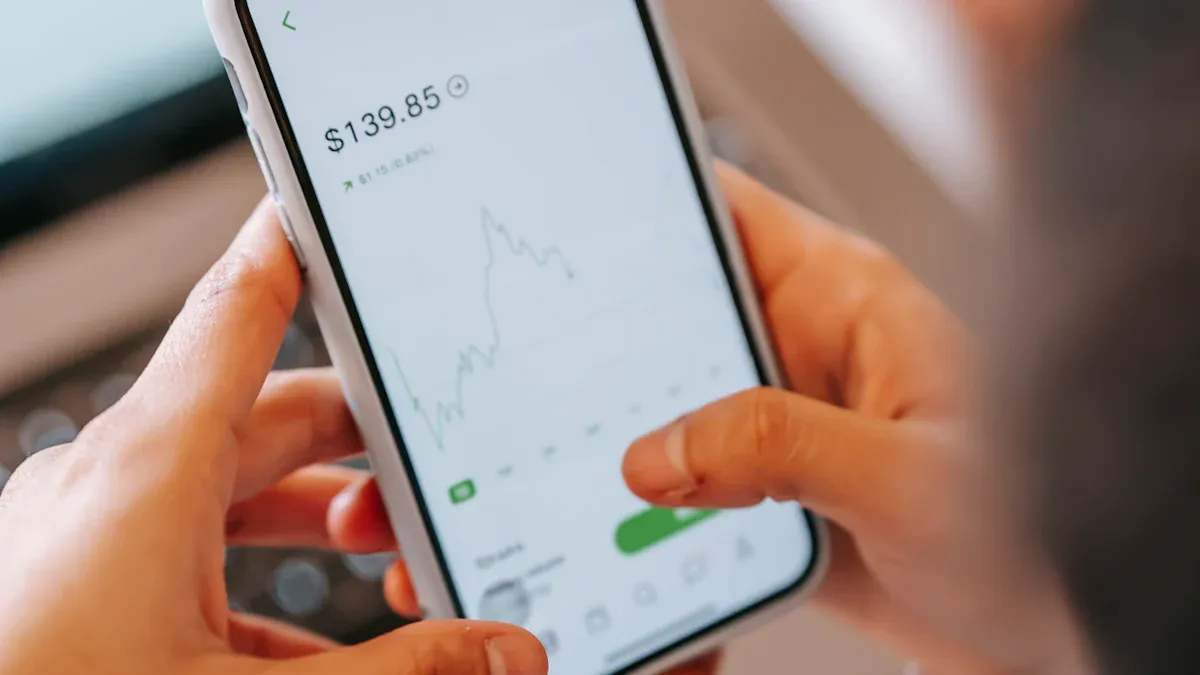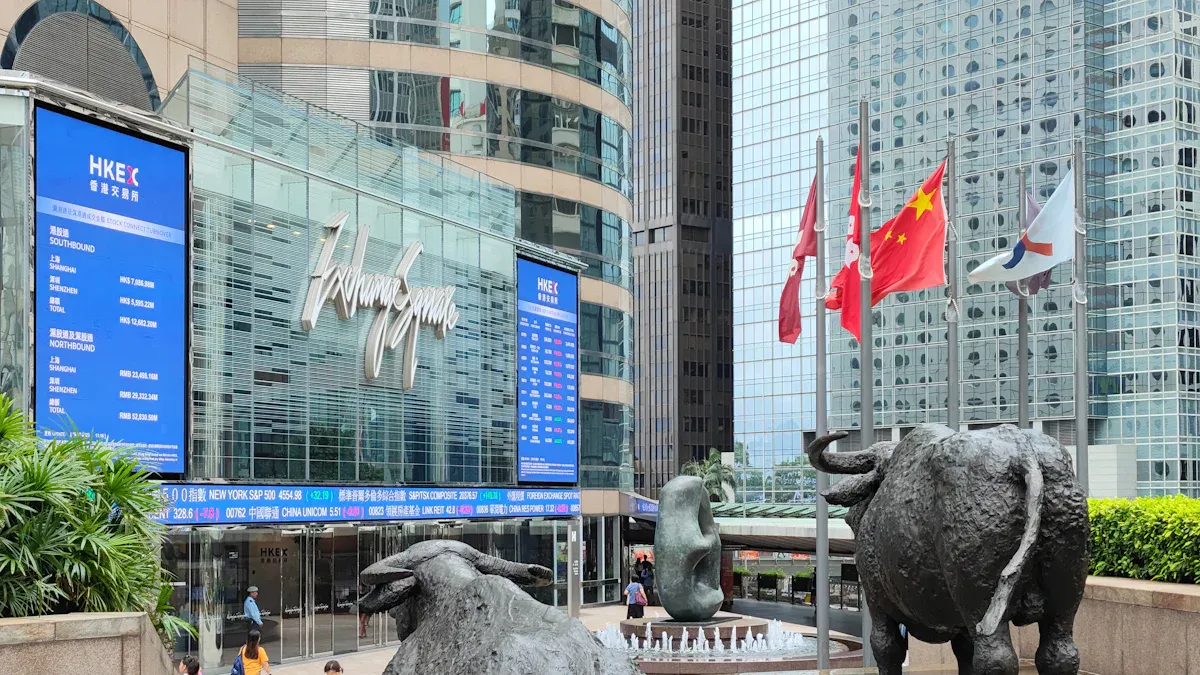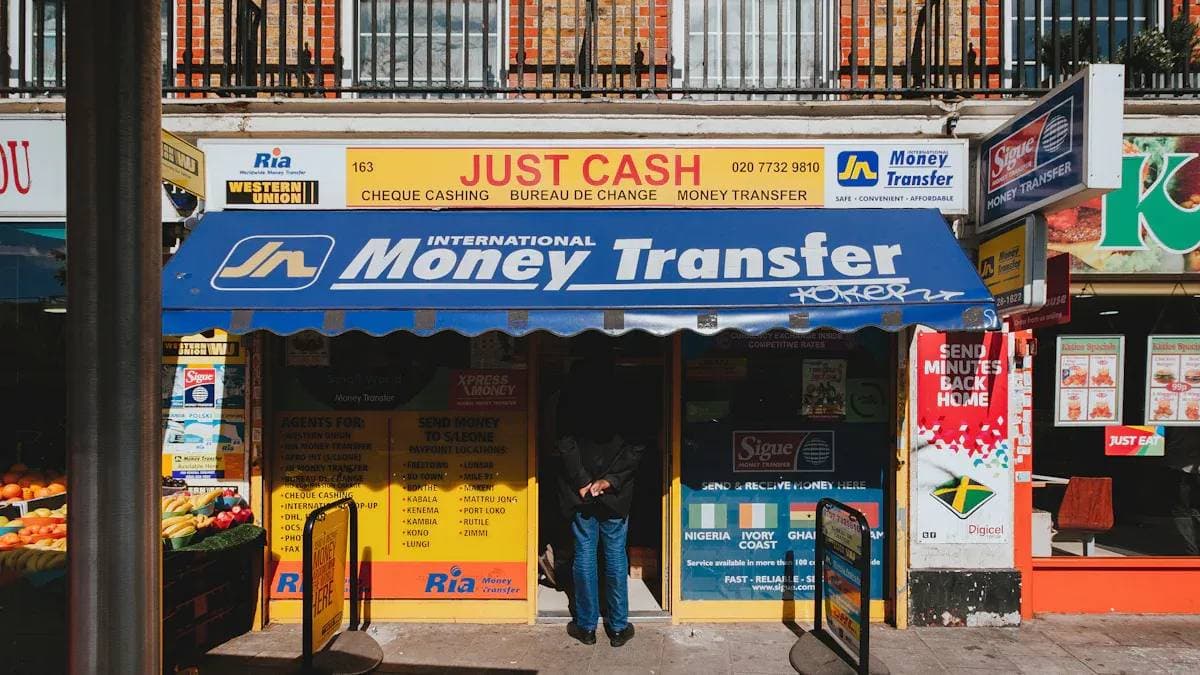- EasyCard
- Trade
- Help
- Announcement
- Academy
- SWIFT Code
- Iban Number
- Referral
- Customer Service
- Blog
- Creator
Hong Kong Stock Trading Fee Comparison: Which Broker Suits Chinese Investors Best

Image Source: pexels
Futu Securities is currently the top choice for Chinese investors trading Hong Kong stocks. They offer Hong Kong stock trading fees as low as 0.01%, support multiple fund deposit and withdrawal channels, and provide a streamlined account opening process. Futu Securities’ platform is user-friendly with fast customer service responses. Compared to Hong Kong banks, Futu is more competitive in commissions and platform fees, effectively helping investors reduce trading costs.
Key Points
- Hong Kong stock trading fees include commissions, platform fees, transaction levies, stamp duty, and settlement fees, which investors must fully understand.
- Brokers like Futu Securities offer low commissions and platform fees, effectively reducing trading costs, suitable for long-term and high-value traders.
- Futu Securities and Interactive Brokers (IB) support online account opening, fast fund transfers, and responsive customer service, enhancing the investment experience.
- Investors should beware of hidden fees like custody fees and account management fees to avoid unnecessary costs.
- Choose a broker based on trading frequency and capital size; small, low-frequency traders should prefer Futu and IB, while high-frequency, large-volume traders may prioritize IB.
Hong Kong Stock Trading Fee Comparison

Image Source: unsplash
Main Fee Components
Hong Kong stock trading fees primarily include commissions, platform fees, transaction levies, stamp duty, and settlement and delivery fees. Each fee impacts investors’ actual returns. Investors must fully understand these fee components when choosing a broker.
- Commissions: Service fees charged by brokers, calculated as a percentage of the transaction amount.
- Platform Fees: Fees charged by some brokers or banks for account management or trading platform usage.
- Transaction Levies: Fixed percentage fees charged by the Hong Kong Stock Exchange.
- Stamp Duty: Taxes levied by the Hong Kong government on stock trades.
- Settlement and Delivery Fees: Fees related to stock delivery and fund settlement.
These fees collectively form the total cost of each Hong Kong stock trade. Different brokers and Hong Kong banks have significant variations in these fee standards.
Commissions and Platform Fees
Commissions and platform fees are the most variable parts of Hong Kong stock trading costs. Brokers typically offer lower commissions and platform fees. For example, Futu Securities’ Hong Kong stock commission is as low as 0.01% (minimum ~$1.5 per trade, based on 1 USD = 7.8 HKD), with a platform fee of $0.99 per trade. IB (Interactive Brokers) charges a 0.03% commission (minimum ~$2 per trade) and a $1 platform fee per trade.
Hong Kong banks generally have higher commissions, typically ranging from 0.25% to 0.5%, with a minimum charge of ~$20 per trade and platform fees between $2-$5 per trade.
Tip: For long-term or high-value trading, choosing brokers with low commissions and platform fees can significantly reduce Hong Kong stock trading costs.
Online trading fees are lower than phone-based trading, which incurs additional service fees, typically $5-$10 per trade.
Transaction Levies and Stamp Duty
Transaction levies and stamp duty are mandatory fees with consistent standards across all brokers and Hong Kong banks.
- Transaction Levy: The Hong Kong Stock Exchange charges 0.005% of the transaction amount.
- Stamp Duty: The Hong Kong government charges 0.13% of the transaction amount.
For example, if you buy $10,000 worth of Hong Kong stocks, you pay $0.5 in transaction levies and $13 in stamp duty.
These fees are unavoidable regardless of the broker chosen. Investors should include them in their overall Hong Kong stock trading cost budget.
Settlement and Delivery Fees
Settlement and delivery fees are primarily for stock delivery and fund settlement. Brokers typically charge lower settlement fees. For example, Futu Securities charges $1.2 per trade for settlement. IB charges $1 per trade for settlement. Hong Kong banks have higher settlement fees, with some charging up to $3-$5 per trade.
Note: Some brokers may charge small custody or account management fees in addition to settlement fees. Investors should review the fee details in advance to avoid increased Hong Kong stock trading costs due to hidden fees.
Through comparison, brokers have clear advantages in commissions, platform fees, and settlement fees. Choosing the right broker helps investors effectively reduce Hong Kong stock trading costs and improve returns.
Service and Convenience

Image Source: pexels
Account Opening Process
When choosing a broker, the convenience of the account opening process is critical. Mainstream brokers like Futu Securities and IB support fully online account opening. Investors need only prepare an ID, bank card, and proof of address, and after uploading documents, accounts can be opened in as fast as 1-2 business days. Hong Kong banks require in-person visits to branches to submit physical documents, with an approval process typically taking 3-7 business days.
Tip: Online account opening saves time and is suitable for investors eager to enter the Hong Kong stock market quickly.
Fund Deposits and Withdrawals
Brokers vary in fund deposit and withdrawal channels and speeds. Futu Securities supports UnionPay, SWIFT, wire transfers, and more, with deposits arriving as fast as the same day and withdrawals typically completed in 1-2 business days. IB supports multi-currency deposits and withdrawals with similar speeds to Futu. Hong Kong banks require deposits via branch counters or online banking, with longer processing times, and withdrawals may take 3-5 business days.
| Broker/Bank | Deposit Methods | Deposit Speed | Withdrawal Speed |
|---|---|---|---|
| Futu Securities | UnionPay, wire transfer, etc. | Same day to 1 day | 1-2 days |
| IB | Wire transfer, SWIFT, etc. | 1 day | 1-2 days |
| Hong Kong Banks | Branch, online banking | 1-3 days | 3-5 days |
Customer Service
Broker customer service directly impacts the investment experience. Futu Securities offers 24/7 online customer support with fast response times. IB provides 24/7 English support, with limited Chinese support hours. Hong Kong banks rely on phone or branch services, with longer wait times and lower resolution efficiency.
Recommendation: Investors should prioritize brokers with fast responses and Chinese support for timely assistance.
Trading Platform Experience
The usability and functionality of trading platforms are equally important. Futu Securities’ platform is user-friendly, supporting market data viewing, news updates, and various trading orders. IB’s platform is feature-rich, ideal for experienced investors. Hong Kong banks’ trading systems have basic functions, traditional interfaces, and less convenient operations.
Investors should choose platforms based on their needs, with brokers offering better usability and functionality being more suitable for frequent traders.
Hidden Fees and Promotions
Hidden Charges
When choosing a Hong Kong stock broker, beyond visible trading fees, investors must beware of hidden charges. Common hidden fees include custody fees, account management fees, agent service fees, and currency exchange fees. Some brokers charge monthly custody fees for held stocks, approximately $1-$2. Account management fees are typically charged quarterly or annually, ranging from $5-$10. Agent service fees apply for tasks like dividends or rights issues, costing ~$2-$5 per transaction. Currency exchange fees arise during multi-currency fund transfers, with rate differences causing additional costs. Investors should carefully review brokers’ fee disclosures to avoid increased investment costs due to overlooked fees.
Promotional Offers
Mainstream Hong Kong stock brokers regularly launch promotions to attract new users or reward existing ones. For example, Futu Securities recently offered new users U.S. stock and Hong Kong stock cash vouchers, up to $100. IB offers platform fee waivers or trading credits during specific periods. Some brokers provide extra cashback or handling fee reductions for high-value deposit users. Investors can stay updated via brokers’ websites or apps for the latest promotional information.
Commission-Free and Cashback Offers
As competition among Hong Kong stock brokers intensifies, commission-free trading and cashback have become common promotional tools. Futu Securities offers new users commission-free Hong Kong stock trading for a limited period, typically 30 or 90 days. IB provides partial commission cashback for active users. Some brokers offer tiered cashback based on trading volume, e.g., $5-$10 for monthly trading volumes exceeding $10,000. Investors can choose commission-free or cashback offers based on their trading frequency and capital size to further reduce Hong Kong investment costs.
Investor Type Recommendations
Small, Low-Frequency Traders
Small, low-frequency traders typically trade infrequently with modest amounts per transaction. Futu Securities and IB offer low commissions and platform fees. Futu Securities’ Hong Kong stock commission is only 0.01% (minimum $1.5 per trade, based on 1 USD = 7.8 HKD), with a $0.99 platform fee per trade. IB’s commission is 0.03% (minimum $2 per trade), with a $1 platform fee per trade. In contrast, Hong Kong banks charge commissions of 0.25%-0.5%, with a minimum of $20 per trade and higher platform fees.
Recommendation: Small, low-frequency traders should choose Futu Securities or IB to effectively reduce trading costs.
High-Frequency, Large-Volume Traders
High-frequency, large-volume traders execute frequent trades with substantial amounts. IB’s platform is feature-rich, suitable for high-frequency trading, with low commission rates and support for API automated trading. Futu Securities also offers tiered cashback and fee reductions for large-volume users.
| Broker | Commission Rate | Platform Fee | Suitable For |
|---|---|---|---|
| Futu Securities | 0.01% and up | $0.99 | High-frequency/large-volume |
| IB | 0.03% and up | $1 | High-frequency/large-volume |
Service-Focused Investors
Some investors prioritize customer service and platform experience. Futu Securities provides 24/7 Chinese customer support, a user-friendly platform, and rich market information. Hong Kong banks have extensive branch networks but slower response times and limited online services.
Service-focused investors should prioritize Futu Securities for timely assistance and a better operational experience.
Flexible Fund Users
Fund flexibility is crucial for some investors. Futu Securities and IB support multiple deposit methods, including UnionPay, wire transfers, and SWIFT, with deposits arriving as fast as the same day and withdrawals completed in 1-2 days. Hong Kong banks have slower deposit and withdrawal speeds, with some withdrawals taking 3-5 days.
Investors prioritizing fund liquidity should choose Futu Securities or IB to enhance fund usage efficiency.
Stock Connect vs. Regular Hong Kong Accounts Comparison
Stock Connect accounts suit investors with large capital and frequent trading but are limited by quotas and trading hours. Regular Hong Kong accounts offer lower fees and flexible trading. Chinese investors can choose the optimal channel based on their capital size and trading needs.
Chinese investors can participate in the Hong Kong stock market through direct Hong Kong accounts, Stock Connect accounts, mutual fund recognition, or QDII funds. When selecting a broker, they should consider Hong Kong stock trading fees, commissions, trading convenience, and capital size. Each investor should rationally compare brokers’ services and promotions, stay updated on market changes, and avoid increased costs due to hidden fees.
FAQ
What documents are needed for Hong Kong stock account opening?
Investors need an ID, bank card, and proof of address. Some brokers also require a selfie. The process is simple, with documents submitted online.
What are the mandatory fees for Hong Kong stock trading?
All investors must pay transaction levies (0.005%), stamp duty (0.13%), and settlement fees. These are unavoidable regardless of the broker.
Are fund deposits and withdrawals to Hong Kong stock accounts safe?
Mainstream brokers like Futu Securities and IB use bank-grade encryption. Investor funds are independently custodied, and deposit/withdrawal processes are compliant and secure.
How to choose the right Hong Kong stock broker?
Investors can refer to the table below:
| Need | Recommended Broker |
|---|---|
| Low Fees | Futu Securities |
| High-Frequency Trading | IB |
| Service-Focused | Futu Securities |
What are common hidden fees for Hong Kong stock brokers?
Common hidden fees include custody fees, account management fees, and currency exchange fees. Investors should carefully review brokers’ fee disclosures to avoid extra costs.
After a deep dive into the Hong Kong stock trading fees and a comparison of different brokers, it’s clear that while platforms like Futu Securities and Interactive Brokers offer many advantages, you still face challenges. For example, the complex fee structures, exchange rate fluctuations, and compliance for cross-border fund transfers all require significant effort on your part. These challenges can all affect the efficiency of your fund transfers and your overall investment experience. BiyaPay was created to solve these pain points, offering a more comprehensive and efficient cross-border financial solution. We have significantly simplified the traditional KYC process with one-stop digital identity verification, allowing you to remit with a fee as low as 0.5% and achieve same-day delivery, completely eliminating opaque exchange spreads and long waits. Moreover, our platform supports the conversion between various fiat and digital currencies, so you don’t need a complex overseas account to invest in both U.S. and Hong Kong stocks on one platform, easily diversifying your assets. Say goodbye to cumbersome processes and opaque fees, and register with BiyaPay today to start your smart investment journey.
*This article is provided for general information purposes and does not constitute legal, tax or other professional advice from BiyaPay or its subsidiaries and its affiliates, and it is not intended as a substitute for obtaining advice from a financial advisor or any other professional.
We make no representations, warranties or warranties, express or implied, as to the accuracy, completeness or timeliness of the contents of this publication.




Contact Us
Company and Team
BiyaPay Products
Customer Services
is a broker-dealer registered with the U.S. Securities and Exchange Commission (SEC) (No.: 802-127417), member of the Financial Industry Regulatory Authority (FINRA) (CRD: 325027), member of the Securities Investor Protection Corporation (SIPC), and regulated by FINRA and SEC.
registered with the US Financial Crimes Enforcement Network (FinCEN), as a Money Services Business (MSB), registration number: 31000218637349, and regulated by FinCEN.
registered as Financial Service Provider (FSP number: FSP1007221) in New Zealand, and is a member of the Financial Dispute Resolution Scheme, a New Zealand independent dispute resolution service provider.




















